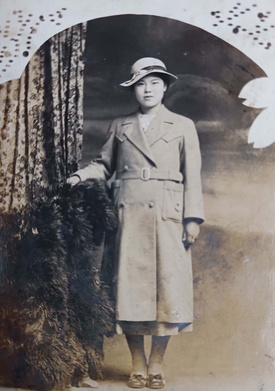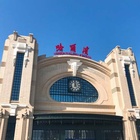"Maybe he was a Japanese orphan."
When I was in high school, people called "Chinese orphans" came to Japan and held a press conference. They called out in tearful Chinese to their parents who may be living somewhere in Japan, saying "I want to see you." They looked Chinese no matter how you looked at them, dressed in Mao suits and unable to understand Japanese. However, they were actually genuine Japanese who were separated from their parents in what was then "Manchuria" shortly after the war and raised by Chinese people. My mother would cry every time she saw the video of the press conference and say, "I could have been a Chinese orphan like those people. I can't think of it as something that doesn't happen to me. But in my case, my mother was desperate and brought me back to Japan with my younger brother and sister. I can't thank her enough."
At the time, I had a vague image of "Manchuria" as a Japanese puppet state that existed in China before World War II. However, that image gradually became more concrete after I read Toyoko Yamazaki's "Child of the Earth," a novel about a Japanese orphan left behind in China, and watched the film "The Last Emperor," which depicts the puppet emperor of Manchukuo.
My mother, Fukuda Emiko (maiden name Kono), was born in Manchuria in 1937. The first person to go to Manchuria was my grandfather, Kono Susumu. After graduating from Hita Forestry and Technical High School in Oita Prefecture, Susumu got a job at a lumber logging facility in Manchuria and eventually brought his wife, Kayo, from his hometown in Oita Prefecture. When Susumu's father first went to take Kayo as a wife for his son, Kayo's father, who ran a lumber business, refused, saying, "I can't send my daughter to a faraway place like Manchuria." However, after the father passed away, the family gave their permission, and Susumu and Kayo were married in 1935.
Memories of my kind father, Susumu
Susumu and Kayo began their married life in Manchuria. Two years later, Emiko was born, followed by a son named Hidenori. However, Hidenori died soon after from dysentery.
According to Emiko's memory, she moved to several places within Manchuria, but the only place she remembers vividly is the scenery of her last home, a place called Suihua (Suika).
"I spent my time there until the second year of elementary school. There were two tenement houses just off the main road, and our house was on the left side as seen from the street. The director of my father's company lived on the right. Once you came out onto the main road, there was a large restaurant called Suigetsu, a bakery, a movie theater and everything else; it was a big town. It was about a 30-minute walk from our house to the station. I remember the layout of the house well. It was Western-style made of red brick, and as you entered the front door, there was a room of about eight tatami mats to the left, and to the right was the kitchen. Beyond that was a room of about six tatami mats, with a pechka (stove) in the middle. The floor was heated with an ondol heater. There was a bathroom and toilet at the very back, but speaking of baths, I often went to a public bath in town rather than at home. I also vividly remember beautiful flowers blooming in the flower bed in the middle of the garden. Speaking of flowers, the potato fields that lined the route to school were covered in beautiful white flowers."
His father, Susumu, was working away from home, managing Chinese workers doing lumbering in the mountains near the Soviet Union. He returned home on weekends and went back to work on Sundays.
"My father was a very kind man. When he came home, the family would go out to eat or to the public bath. However, this kind father scolded me once. I don't know what the reason was, but I put my hand in his suit pocket. He became furious and said, 'You shouldn't put your hand in someone else's pocket.' I still can't forget that moment."
The elementary school I went to was a Japanese school, so naturally, all of my friends were Japanese.
"My good friends were Sawada Akihiko, from Akita, and Ishiguro Kazuko. Ishiguro was the niece of the famous judoka Ishiguro Keiichi. Then there was Sasaki Reiko, although I can't remember where she was from. I received letters from her after she returned to Japan, but I didn't have the time to keep in touch. I also got along well with Nogi, who was from Nara. My classmates' hometowns were scattered all over Japan."
A prosperous life in Manchuria
Japanese people were likely placed at the highest level in Manchuria at the time, but was there discrimination against other ethnic groups such as Chinese, Russians and Koreans? Emiko responded, "For some reason, there was a Russian boy named Alexei who attended our Japanese school. He was the only Russian among all the Japanese students. There was also a Korean school nearby. I don't remember my parents ever telling me not to associate with anyone other than Japanese people. However, I had no contact with Koreans or Chinese people, and my life was entirely confined to Japanese society, so naturally Japanese was the everyday language."
"Maybe I just didn't notice because I was still a child, but I don't remember any racial conflicts. Moreover, I think the security situation in Manchuria was very good. I always walked home by myself from elementary school, a distance of about 30 minutes, but I never encountered any danger."
Emiko's most vivid memory of Manchuria is of food.
"The sausages and pirozhki made by the Russians were especially delicious. One time, my mother asked me to go into town to buy some meat, but I ended up buying pirozhki instead of meat with the money she had given me. My mother scolded me severely. Not only the things on sale were delicious, but the boiled dumplings my mother made at home were also incredibly tasty."
For Emiko, her childhood in Manchuria was "rich and peaceful," with friends at the Japanese school and life in a town with an exotic atmosphere. However, that changed dramatically after her father was drafted in May 1945.
© 2022 Keiko Fukuda







